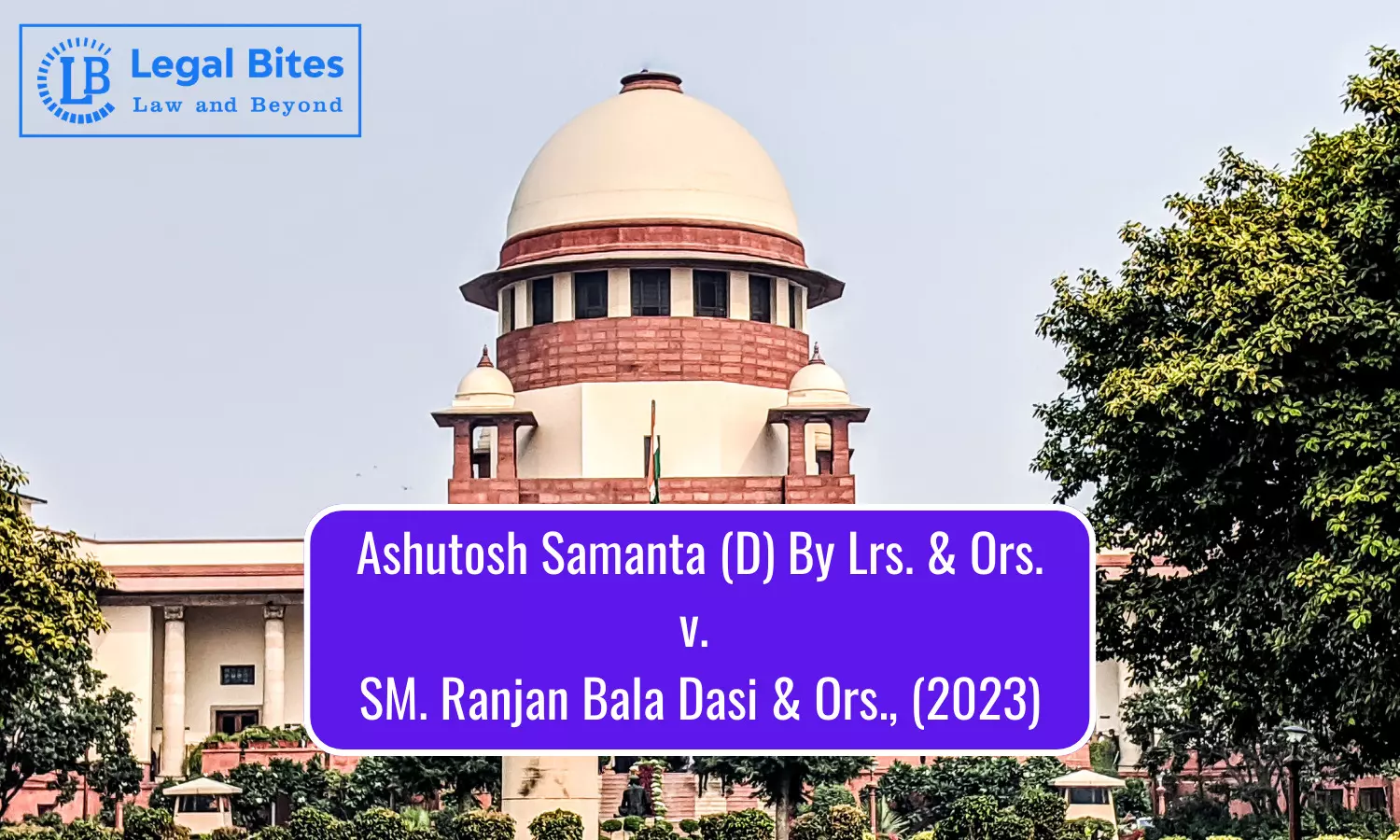Case Analysis: Ashutosh Samanta (D) By Lrs. & Ors. v. SM. Ranjan Bala Dasi & Ors., (2023) | Wills cannot be proved only on the basis of age
The Case Analysis: Ashutosh Samanta (D) By Lrs. & Ors. v. SM. Ranjan Bala Dasi & Ors., (2023) elucidates the decision of the Supreme Court regarding Will.

The Case Analysis: Ashutosh Samanta (D) By Lrs. & Ors. v. SM. Ranjan Bala Dasi & Ors., (2023) elucidates the decision of the Supreme Court regarding Will. According to the Supreme Court, a Will is not subject to the presumption under Section 90 of the Indian Evidence Act regarding the veracity of papers that are more than thirty years old. "Wills cannot be proved only on the basis of their age - the presumption under Section 90 as to the regularity of documents more than 30 years of...
The Case Analysis: Ashutosh Samanta (D) By Lrs. & Ors. v. SM. Ranjan Bala Dasi & Ors., (2023) elucidates the decision of the Supreme Court regarding Will. According to the Supreme Court, a Will is not subject to the presumption under Section 90 of the Indian Evidence Act regarding the veracity of papers that are more than thirty years old. "Wills cannot be proved only on the basis of their age - the presumption under Section 90 as to the regularity of documents more than 30 years of age is inapplicable when it comes to proof of wills", the Court held following the precedent M.B. Ramesh (D) by L.Rs. v. K.M. Veeraje Urs (D) by L.Rs. & Ors. [Civil Appeal No. 1071/2006], decided on 03.05.2013.
The Hon'ble Supreme Court further stated that A Will must be proven in accordance with Sections 63(c) of the Indian Succession Act, 1925, and Section 68 of the Indian Evidence Act, 1872, the court further stated. The court was debating a challenge to a judgment and decree upheld by the Calcutta High Court that granted a petition for the issuance of letters of administration under Section 278 of the Indian Succession Act, 1925.
Case Title: Ashutosh Samanta (D) By Lrs. & Ors. v. SM. Ranjan Bala Dasi & Ors.
Court: Supreme Court of India
Citation: Civil Appeal No. 7775 of 2021
Judges: Justices S. Ravindra Bhat, Dipankar Datta
Date: 14th March 2023
Facts of the Case
The testator, one Gosaidas Samanta, had three sons: Upendra, Anukul, and Mahadev. He left behind a Will dated November 16, 1929, and was survived by his widow Bhagbati Das, three kids, and other family members. Three heirs received the testator's estate: his sons Anukul and Mahadev, as well as his grandson Shibu, the son of Upendra (who was not granted any share).
A division document was created between these three joint owners in 1945. Upendra, who signed a disclaimer document for one portion of the assets sold by Shibu out of his share, appears to have accepted this arrangement. In 1952, he claimed to be in possession of some of the testator's possessions and that he had acquired them from Upendra. The current appellant brought a partition and possession claim. The claim was rejected on the premise that the present appellant had no title.
The appeal court, however, overturned that decision and issued a preliminary ruling for partition. Once the current respondent (the son of Mahadev) filed a second appeal, the High Court observed that although the Will had been cited, neither letters of administration nor probate had been requested in relation to it.
The High Court questioned the respondent's ownership in this case. The respondents, in this case, sought the Trial Court in light of the Supreme Court's ruling, specifically the lack of probate or letters of administration. None of the testifying witnesses was still living at the time of the trial.
Hence, the trial court relied on the depositions of two of the testator's sons as well as those of Surendra Nath Bhowmick, who claimed to have witnessed the testator properly sign the will. The current appellant, who bought the properties from Upendra, opposed the administration proceedings. He argued that because relief wasn't sought for an excessively lengthy time, the procedures couldn't be maintained. The trial court based its decision on the testimony of the witnesses as well as the documents submitted, including the registered deed of division that specifically referred to the disputed will. The trial court also cited a deed that Upendra had signed and which also made mention of the will.
The Trial court also cited a deed that Upendra had signed, which also made mention of the Will. The respondent was entitled to letters of administration, according to the Trial Court's record. An appeal against that decision was turned down. Hence, the current appeal made it to the Supreme Court.
Issues Involved
- Whether Will can be proved only on the basis of their age, as stated in Indian Evidence Act 1872 (Section 90)?
- Whether Wills can be proved using the Section 90 assumption regarding the regularity of papers that are older than 30 years?
- Whether Wills need to be supported by evidence?
Will needs to be supported by evidence in accordance with Sections 63(c) of the Succession Act of 1925 and Section 68 of the Evidence Act of 1872. Section 69 of Indian Evidence Act, of 1872 states that in the event that attesting witnesses may have passed away or cannot be located, the propounder is not at a complete loss.
Laws applied
Section 90 of Indian Evidence Act 1872:
Presumption as to documents thirty years old. –– Where any document, purporting or proved to be thirty years old, is produced from any custody which the Court in the particular case considers proper, the Court may presume that the signature and every other part of such document, which purports to be in the handwriting of any particular person, is in that person’s handwriting, and, in the case of a document executed or attested, that it was duly executed and attested by the persons by whom it purports to be executed and attested.Explanation.–– Documents are said to be in proper custody if they are in the place in which, and under the care of the person with whom, they would naturally be; but no custody is improper if it is proved to have had a legitimate origin, or if the circumstances of the particular case are such as to render such an origin probable.This explanation applies also to section 81.
Section 68 of Indian Evidence Act 1872:
Proof of execution of document required by law to be attested. –– If a document is required by law to be attested, it shall not be used as evidence until one attesting witness at least has been called for the purpose of proving its execution, if there be an attesting witness alive, and subject to the process of the Court and capable of giving evidence:
[Provided that it shall not be necessary to call an attesting witness in proof of the execution of any document, not being a will, which has been registered in accordance with the provisions of the Indian Registration Act, 1908 (16 of 1908), unless its execution by the person by whom it purports to have been executed is specifically denied.]
Section 69 of the Indian Evidence Act 1872
Proof where no attesting witness found. –– If no such attesting witness can be found, or if the document purports to have been executed in the United Kingdom, it must be proved that the attestation of one attesting witness at least is in his handwriting, and that the signature of the person executing the document is in the handwriting of that person.
Section 63(c) of the Indian Succession Act, 1925:
Execution of unprivileged wills.—Every testator, not being a soldier employed in an expedition or engaged in actual warfare, [or an airman so employed or engaged,] or a mariner at sea, shall execute his will according to the following rules:—
(c) The will shall be attested by two or more witnesses, each of whom has seen the testator sign or affix his mark to the will or has seen some other person sign the will, in the presence and by the direction of the testator, or has received from the testator a personal acknowledgement of his signature or mark, or of the signature of such other person; and each of the witnesses shall sign the will in the presence of the testator, but it shall not be necessary that more than one
Judgment
The Court, in this instance, explained the legal requirements before pointing out that both of the attestation witnesses had passed away. The testator's two sons gave testimony regarding their presence during the signing of the Will. They also recognised Nivas Bhuiya's signatures, who drew and signed the Will. In addition, Nivas Bhuiya's son Phani Bhusan Bhuiya (PW-4) was deposed. He testified in his testimony that he saw the testator and the two attesting witnesses and then sign the will, and he was able to recognise their signatures.
This witness had a degree and was well-educated. He testified about who was present, where, and under what conditions the will was signed. The witness also endured cross-examination, according to the court.
The Trial court had also relied on the partition document, which gave it effect and in which shares were divided in line with the terms of the will, in addition to the testimony of witnesses, the court said. It was emphasised that the document was a registered one and that late Upendra, the appellant's predecessor, had also signed a document confirming the will's existence.
The partition document, which gave it effect and in which shares were distributed in line with the terms of the will, was another source of support used by the trial court in addition to the testimony of witnesses. This document was registered, and the appellant's predecessor, the late Upendra, also signed a document acknowledging the will's existence.
The Court, therefore, determined that the will had been properly executed.
There can be only one conclusion, which is that the will was duly executed, and the propounder/respondent, in this case, was successful in proving it, if all the aforementioned circumstances are taken into account collectively and one also keeps in mind the fact that none of Upendra's heirs contested the grant of letters of administration.
As a result, the appeal was denied.
Important Links
Law Library: Notes and Study Material for LLB, LLM, Judiciary, and Entrance Exams

Ananya Kukreti
Ananya has a strong inclination towards policy research and business laws. Institution: Amity University, Noida
